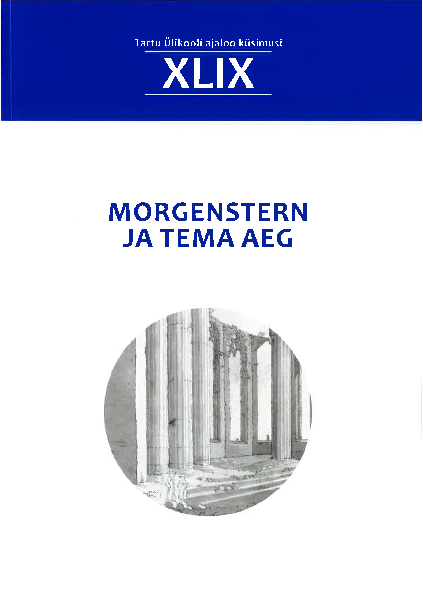Tartu ülikooli üldise õpetajate instituudi kaasdirektorid Jäsche ja Pöschmann ning nende pedagoogilised vaated
Jäsche and Pöschmann, Co-directors of the General Teacher's Institute of the University of Tartu
DOI:
https://doi.org/10.15157/tyak.vi49.18379Abstract
One of the important tasks of the University of Tartu/Dorpat, which
was reopened in the spirit of the Enlightenment in 1802, was to train
teachers for local provinces. The General Teachers’ Institute (1803–
1820) had three directors: philologist Morgenstern, philosopher
Jäsche and historian Pöschmann. All three directors were also members
of the university school committee and thus directly contributed
to the formation of the Tartu school district. While Morgenstern dreamed
of a philological seminary from the very beginning, believing
that the moral upbringing of teachers based on antique models was
paramount in educating teachers, the General Teachers’ Institute at
the University of Tartu initially followed the direction of teaching
many different subjects (including sciences). Morgenstern’s pedagogical
views have been described repeatedly, but those of the other two
directors have not.
As a philosopher, Jäsche has been considered a follower of Immanuel
Kant, and his pedagogical views, which have reached us through
a speech he gave to students in 1808, were also clearly influenced
by Kant. He considered that studying at a university should be a
conscious and purposeful effort, but not a dull craft. Its ultimate goal
was to improve oneself and others, and the path to personal happiness
was to serve society to the best of one’s ability.
Pöschmann lived and worked in Tartu for a short while (10 years,
he died in 1812), but he managed to prove himself as a very enthusiastic
academic instructor and organiser. He played an important role
in the school committee, for example in founding the Vyborg Girls’
School. He can also be considered a pioneer of the local Livonian school-
history writing.
In order to improve the instruction of students, which Pöschmann
considered essential in view of the characteristics of the local school
system, he compiled a number of handbooks highly valued by his
contemporaries. His Einleitung in die allgemeine Menschengeschichte
als Leitfaden zu akademischen Vorlesungen von G. Fr. Pöschmann
provided an overview of the history, sources, and auxiliary sciences
of historical writing. His book about studying at the university titled
Ueber die zweckmässige Führung des academischen Lebens: ein
Leitfaden zu Vorlesungen von G. Fr. Pöschmann was intended as a
guide for young men who had to start organising their own life when
they flew the nest. In addition to explaining the system of all sciences
and the best techniques for studying at university, the book included
practical instructions for budgeting ec. In his keynote speech, in
which Pöschmann spoke of new and old methods of education (1808),
he showed himself to be a moderate school innovator who was able
to maintain a balance between the variety of methods and teachings
prevailing at the time, and, above all, respect for both teachers and
students. So many of the topics that were relevant at the time (e.g.,
how much material should be memorised or how strict discipline
should be) are still at the forefront today.
In their surviving publications, both co-directors of the General
Teachers’ Institute display broad ideas inspired by the Enlightenment,
and their activities in the school committee showed their readiness
to contribute to the spread of education.

